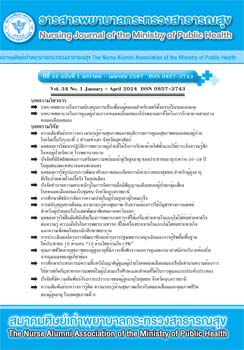การศึกษาประสบการณ์ความสิ้นหวังในญาติผู้ดูแลผู้ป่วยโรคหลอดเลือดสมอง
Main Article Content
บทคัดย่อ
การดูแลผู้ป่วยโรคหลอดเลือดสมองในระยะยาวนับเป็นภาระที่หนักซึ่งอาจสร้างความเหนื่อยล้าและความเครียดให้กับผู้ดูแลได้อย่างมาก งานวิจัยครั้งนี้เป็นงานวิจัยเชิงคุณภาพแบบพรรณนา เพื่ออธิบายประสบการณ์ความสิ้นหวังในญาติผู้ดูแลผู้ป่วยโรคหลอดเลือดสมองในชุมชน กลุ่มตัวอย่างคือ ญาติผู้ดูแลผู้ป่วยโรคหลอดเลือดสมองในชุมชน จำนวน 10 คน เก็บรวบรวมข้อมูลโดยใช้การสัมภาษณ์แบบเจาะลึก ระหว่างเดือนกันยายน พ.ศ. 2564 ถึงเดือน เมษายน พ.ศ. 2565 และวิเคราะห์ข้อมูลด้วยวิธีการวิเคราะห์เชิงเนื้อหา ผลการวิจัย พบว่า ญาติผู้ดูแลมีการรับรู้เกี่ยวกับความสิ้นหวังในการดูแลผู้ป่วยโรคหลอดเลือดสมองในชุมชน 5 ประเด็นหลัก ได้แก่ 1) รับรู้ว่าความสิ้นหวังในการดูแลผู้ป่วยโรคหลอดเลือดสมอง คือความรู้สึกเหนื่อย ท้อใจ โทษตนเองและผิดหวังจากการที่ดูแลผู้ป่วยแล้วอาการไม่ดีขึ้น จนเกิดความรู้สึกไม่อยากดูแลผู้ป่วยต่อไป 2) ญาติผู้ดูแลทุกคนมีประสบการณ์ในการเกิดความสิ้นหวังจากการดูแลผู้ป่วยโรคหลอดเลือดสมองในช่วงที่ผู้ป่วยเจ็บป่วยในช่วงปีแรก มีอาการแย่ลง ต้องกลับเข้าไปรักษาที่โรงพยาบาลและญาติผู้ดูแลมีความเครียดส่วนตัว 3) สาเหตุที่ทำให้ญาติผู้ดูแลเกิดความสิ้นหวังในการดูแลผู้ป่วยโรคหลอดเลือดสมองมีทั้งจากญาติ ผู้ดูแลเอง จากผู้ป่วยและครอบครัว 4) ความสิ้นหวังในการดูแลผู้ป่วยโรคหลอดเลือดสมองจะส่งผลกระทบโดยตรงต่อผู้ป่วยและญาติผู้ดูแลโดยตรง และ 5) วิธีการสร้างความหวังให้สามารถดูแลผู้ป่วยได้อีกครั้งคือการมองหาผู้ช่วยในการดูแล การสร้างแรงจูงใจและพลังในตนเอง และเข้าใจการดำเนินของโรค ผลการศึกษาในครั้งนี้ช่วยให้เข้าใจปรากฏการณ์ความสิ้นหวังในญาติผู้ดูแลผู้ป่วยโรคหลอดเลือดสมองในชุมชน สาเหตุ ผลกระทบและวิธีการลดความสิ้นหวังได้ ซึ่งอาจเป็นข้อมูลพื้นฐานสำหรับบุคลากรด้านสุขภาพในการทำความเข้าใจ และให้ความช่วยเหลือได้อย่างสอดคล้องกับความต้องการของญาติผู้ดูแลผู้ป่วยโรคหลอดเลือดสมองในชุมชน
Article Details

อนุญาตภายใต้เงื่อนไข Creative Commons Attribution-NonCommercial-NoDerivatives 4.0 International License.
บทความและรายงานวิจัยในวารสารพยาบาลกระทรวงสาธารณสุข เป็นความคิดเห็นของ ผู้เขียน มิใช่ของคณะผู้จัดทำ และมิใช่ความรับผิดชอบของสมาคมศิษย์เก่าพยาบาลกระทรวงสาธารณสุข ซึ่งสามารถนำไปอ้างอิงได้
เอกสารอ้างอิง
Hirunkhro B. Care management model for elderly stroke patient at home. EAU Heritage Journal Science and Technology 2017;11(3):112-21.(in Thai)
Paksee N, Srivisai T, Khunkaew S. Preparation of family caregivers of patient with stroke on transitional care from hospital to home. Boromarajonani College of Nursing, Uttaradit Journal 2021;13(1):47-61. (in Thai)
Tong AU, Samartkit N. Influences of caregivers’ preparedness, caregivers’ burden and caregiver’ reward on adaptation of caregivers caring for patients with stroke. Journal of Nursing Division 2017;46(3):88-102.(in Thai)
Prombut P, Piaseu N, Sakulhongsopon S. Factors related to stress of family caregiver of patients with stroke at home. Ramathibodi Nursing Journal 2014;20(1):82-96.(in Thai).
Pinar G, Pinar T, Ayhan A. The strain and hopelessness in family caregivers of patients with gynecologic cancer receiving chemotherapy.International Journal of Hematology and Oncology 2012;22(3):170-80.
Pongsuwan C, Ruangroengkulrit P, Balthip K. The long-term management process of caregivers caring for stroke survivors in Muang district, Yala province. Nonthaburi: Health Systems Research Institute. 2019. (in Thai)
Aloba O, Ajao O, Alimi T, Esan O. Psychometric properties and correlates of the beck hopelessness scale in family caregivers of Nigerian patients with psychiatric disorders in Southwestern Nigeria. Journal of Neurosciences in Rural Practice 2016;7(1):18-25.
Liu RT, Kleiman EM, Nestor BA, Cheek SM. The hopelessness theory of depression: a quarter century in review. Clinical Psychology: Science and Practice 2015;22(4):345–365.
Lalitananpong D. Emergency psychiatry. Bangkok: Chulalongkorn University Printing House. 2018. (in Thai)
Yotthongdi N, Sunthornchaiya R. Factors related to hopelessness of elderly patients with depressive disorder and physical illness. Journal of Boromarajonani College of Nursing, Bangkok 2017;33(1): 29-39.(in Thai)
Chayawatto C. Depression in the caregivers of stroke patients. Region 4-5 Medical Journal 2016;35(1): 14-27.(in Thai).
Bannaasan B, Pothiban L. Hopelessness of cancer survivors. The Journal of Psychiatric Nursing and Mental Health 2018;32(2):1-12.(in Thai)
Department of Disease Control. Mortality rate of patients with ischemic stroke [internet]. 2020 [cited 20 May 2022]. Available from: http://healthkpi.moph. go.th /kpi2/kpi/index/. (in Thai)
Van Manen M. Researching lived experience: human science for an action sensitive pedagogy. London: Routledge. 1997.
Lincoin YS, Guba EG. Naturalistic inquiry. United States of America: Sage. 1985.
Yotthongdi N. Factors related to hopelessness of elderly patients with depressive disorder and physical illness [Master thesis]. Bangkok: Chulalongkorn University. 2015.(in Thai)
Karayagiz M, Gonca, Coskun C, Sibel. The family burdens and hopelessness of Turkish parents of adolescents with Intellectual disabilities. Rehabilitation Nursing 2018;43(6):351-62.
Melendez JC, Delhom I, Satorres E, Abella M, Real E. Hopelessness as a predictor of loneliness in older adults. Revista Espanola de Geriatria y Gerontologia 2022;57(2):85-9.
Serafini G, Lamis DA, Aguglia A, Amerio A, Nebbia J, Geoffroy PA, et al. Hopelessness and its correlates with clinical outcomes in an outpatient setting. Journal of affective disorders 2020;263(-): 472-9.
Kasemkitwattana S, Prison P. Chronic patients’ family caregivers: a risk group that must not be overlooked. Thai Journal of Nursing Council 2014;29(4):22-31.(in Thai)
Phimphanchaiyaboon L, Phasuk S, Angsirisak N, Boonlom N, Prakhinkit S. The relationship between social support and stress of caregivers caring for patients with schizophrenia. Journal of Health and Nursing Research 2021;37(2):263-73.(in Thai)
Dang Q, Zhang B, Nunez A. Factors associated with hopelessness and the role of social networks among Chinese older adults. Archives of Gerontology and Geriatrics 2021;92 (-):104261.
Dwyer ST, Moyle W, Zimmer GM, De LD. Suicidal ideation in family careers of people with dementia. Aging & mental health 2016;20(2):222-30.
Suksawat B, Hengudomsub P, Nabkasorn C. The effects of group cognitive behavioral modification program on hope and depression among community-dwelling older adults. The Journal of Faculty of Nursing Burapha University 2017;25(1):95-107. (in Thai)

